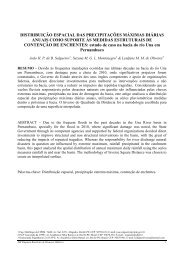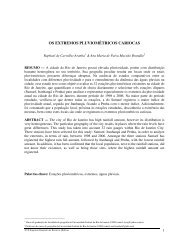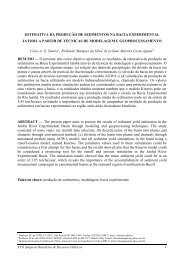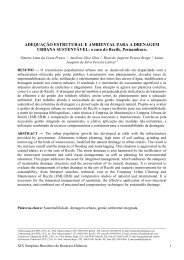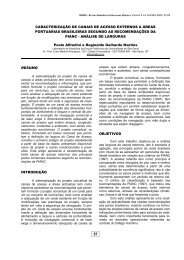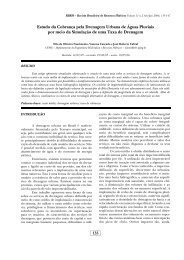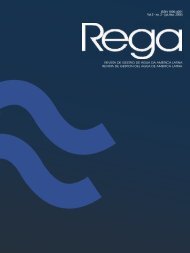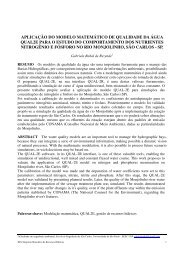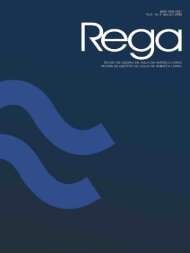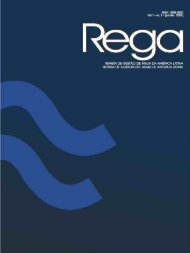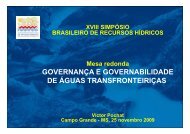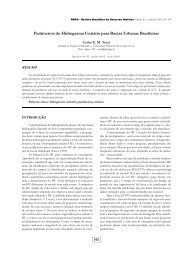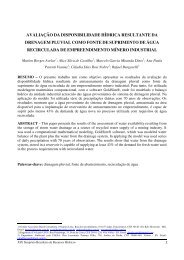Rega-17 (sem issn) - Cepal
Rega-17 (sem issn) - Cepal
Rega-17 (sem issn) - Cepal
- No tags were found...
Create successful ePaper yourself
Turn your PDF publications into a flip-book with our unique Google optimized e-Paper software.
REGA – Vol. 1, no. 1, p. 37-46, jan./jun. 2004404This type of regulation had the approval of financial institutionssuch as the World Bank, which in a report on the countrystated, “(…) in the Bolivian context, it is appropriate for theSuperintendence to award the concessions. In principle thisposes a conflict of interest but the arrangement has workedwell in other sectors…” (WORLD BANK, 1999 xxvii.).acter that classified the users into nine groups.In accordance with this structure, the licensee(concessionaire) was guaranteed a minimumreturn rate of 15% and a maximum of <strong>17</strong>% ontheir investment. To obtain these returns, anincrease in the tariffs (charges for water) wasnecessary, which during January 2000 was anaverage of 35%, but reaching at times levels of150%. Furthermore, it was allowed accordingto the Contract that “the value in dollars of allthe rates ... will be adjusted annually... takinginto account cost-inflation in American dollarsexpressed as variations in the Consumer PricesIndex in USA”. (Annex inc, 1.5 of the Contractof AdT). All this, together with irregularitiesin the tender process and in the executionof the Contract caused an immediate reactionfrom several sectors of the populationof Cochabamba.Soon after signing the Contract that privatisedSEMAPA, the No. 2029 Act on the “Prestacionde Servicios de Agua Potable y AlcantarilladoSanitario” (Provision of Drinking Water andSewage Services) was approved. This Act was anational set of rules aimed at regulating thesector, but in addition due to the absence ofrelevant legislation in the country the Act containedstipulations about the use and exploitationof the resource itself. Among other things,through an Interim Section, the Act gave amplefaculties to assign rights over the water resourcesto the sector authority for Basic Sanitation,without establishing any regulation overguidance criteria, limitations, rights and obligationsof the licensee. 4 On the other hand,despite progress in discussions about the acknowledgementof the rights of the indigenousand peasant communities in the process of thedrafting of the new Act, the No. 2029 Act didnot include any stipulation to this respect. <strong>Rega</strong>rdingthe provision of services, the No. 2029Act granted special privileges to large companiesand cooperatives, such as exclusive rightsfor providing basic sanitation services and utilisationof water sources for a period of 40 years.More precarious rights were granted to watercommittees, cooperatives, communal systemsetc. with a duration of only 5 years.The exclusive rights to the Concessions,implying a de facto monopoly, were furthercomplemented by other stipulations such as:the prohibition of establishing new abstractionpoints by others in the area of the Concession,the obligation of consumers to be connectedto the system and the prohibition of alternativesystems of provision of services within thearea in concession. The bias of the Act towardsprivatisation was explicit and expressed itselfthrough stipulations seeking economic efficiencywithout regulation to ensure benefits alsopassed to the users, 5 instead of seeking to providea universal, social and equitable access tothe service. There were regulations clearlyaimed at favouring private companies (greaterlegal safeguards and monopoly) and stipulationsdiscouraging a more social and community-orientedmanagement of the service,imposing a never-ending string of limitations,such as the possibility of preventive interventions,for example. This bias was also expressedin the policy of decreasing public subsidies tothe sector, under the principle of “full-cost recovery”expressed in the tariff regime.Both in the awarding of the Contract ofConcession as well as in the process of approvalof the No. 2029 Act, the participation of thepopulation was limited. The government invitedthose that were considered as “stakeholders”but that in reality did not represent thekey sectors of the population. Representationwas formal and legalised, but not necessarilylegitimate. And awarding the service to a privatecompany meant a subsequent reductionin the possibilities for social control and users’participation.A combination of factors including the discontentof the peasant communities concernedabout access to water for irrigation andcommunity managed water supplies, urbanconsumers and social organizations who weredissatisfied with the new tariff regime that the5Under English legislation, companies are obliged to passthe gains in efficiency to the users, so the rates come down.



